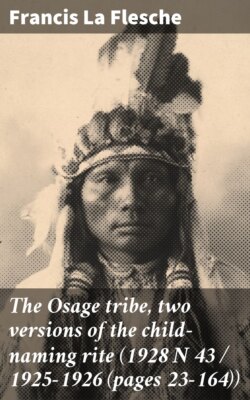Читать книгу The Osage tribe, two versions of the child-naming rite (1928 N 43 / 1925-1926 (pages 23-164)) - Francis la Flesche - Страница 25
На сайте Литреса книга снята с продажи.
The Wa-the´-the Ceremony
ОглавлениеTable of Contents
When all the Noⁿ´-hoⁿ-zhiⁿ-ga have become settled in their places, according to gentes, the A´-ḳi-hoⁿ Xo´-ḳa proceeds with the ceremonial acts called Wa-the´-the, which, translated literally, means, The Sending; that is, the sending of a fee of a blanket or other article of value to each, head of the gentes taking part in the child-naming ceremony. It is understood by these ceremonial acts that the members of the gens to whose head is sent a fee are requested to recite the wi´-gi-e relating to the Life Symbol of their gens. Each article is received from the hands of the A´-ḳi-hoⁿ Xo´-ḳa by the Sho´-ḳa who delivers it to the head of the gens for whom it is sent.
Wa-xthi´-zhi, who gives this child-naming ritual of his gens, the Puma, when acting as A´-ḳi-hoⁿ Xo´-ḳa, sends the fees in the following order:
Ṭsi´-zhu Wa-shta-ge: Fee, with a red downy eagle feather, symbolizing the sun. The members of the gens will recite their wi´-gi-e relating to the life-giving power of the sun. (See 36th Ann. Rept. Bur. Amer. Ethn., p. 124, lines 1 to 177.)
Wa-ça´-be: Fee; will recite the Zha´-zhe Ḳi-ṭoⁿ Wi´-gi-e, Name Wi´-gi-e of the gens. (See 36th Ann. Rept. Bur. Amer. Ethn., p. 228, lines 238 to 304.) The Wa-ça´-be and the Iⁿ-gthoⁿ´-ga gentes are closely related and one acts as Sho´-ḳa for the other in their ceremonies of initiation into the mysteries of the tribal rites.
Ṭsi´-zhu Wa-noⁿ: Fee; will recite their wi´-gi-e relating to the life-giving power of the sun, their life symbol. (See 36th Ann. Rept. Bur. Amer. Ethn., p. 118, lines 1 to 36.)
Hoⁿ´-ga A-hiu-ṭoⁿ: Fee; will recite wi´-gi-e relating to the mottled eagle, the “stainless” bird that led the people down from the sky to the earth. (See 36th Ann. Rept. Bur. Amer. Ethn., p. 162, lines 177 to 311.)
Mi-k’iⁿ´ Wa-noⁿ: Fee; the members of this gens will recite their wi´-gi-e relating to the moon and all the stars and to their power to aid the “little ones” to reach old age. (See 36th Ann. Rept. Bur. Amer. Ethn., p. 122, lines 1 to 44.)
O´-poⁿ: Fee; the members of the gens will recite the Wa-dsu-ṭa I-hi-thoⁿ-be Wi´-gi-e which tells of the various places of the earth where the little ones may find the animals on which to live. (See 36th Ann. Rept. Bur. Amer. Ethn., p. 112, lines 1 to 109.)
Tho´-xe: Fee; some grains of maize are also sent. The members of this gens will recite the wi´-gi-e relating to the bringing of the maize to the people by a buffalo bull, and to his offer to aid the little ones to reach old age. (See 36th Ann. Rept. Bur. Amer. Ethn., p. 280, lines 83 to 110; also p. 134, lines 1 to 162.)
Wa´-ṭse-ṭsi Wa-shta-ge: Fee, with cedar fronds. Members of this gens will recite their wi´-gi-e relating to the red cedar, an evergreen tree which has power to resist death, and to its offer to aid the little ones to reach old age. (See 36th Ann. Rept. Bur. Amer. Ethn., p. 95, lines 1 to 34.)
Ho´ I-ni-ḳa-shi-ga: Fee, with a kettle of water. The members of this gens will recite their wi´-gi-e relating to the everflowing water which, has power to help the little ones to reach old age. These are the Fish people. (See 36th Ann. Rept. Bur. Amer. Ethn., p. 98, lines 1 to 35.)
Wa-zha´-zhe çka: Fee, with a mussel shell. The mussel is the life symbol of this gens. The members of the gens will recite their wi´-gi-e relating to the power of the mussel to resist death, and to its consent to aid the little ones to reach old age. The Wa-zha´-zhe çka are a water people. (See 36th Ann. Rept. Bur. Amer. Ethn., p. 94, lines 1 to 29.)
Ṭa I-ni-ḳa-shi-ga, the Deer People: Only a fee is sent to them. The members will recite their Wa-dsu´-ṭa I-hi-thoⁿ-be Wi´-gi-e, which tells of the various places of the earth where the deer will reveal themselves to the little ones to give them help to reach old age. (See 36th Ann. Rept. Bur. Amer. Ethn., p. 97, lines 44 to 103.)
When the Sho´-ḳa had delivered the last fee every Noⁿ´-hoⁿ-zhiⁿ-ga who knows his wi´-gi-e begins to recite it in a loud voice. None of the wi´-gi-es are alike and none of the members of a gens recite in unison, consequently there would be a volume of sounds most bewildering to the uninitiated.
